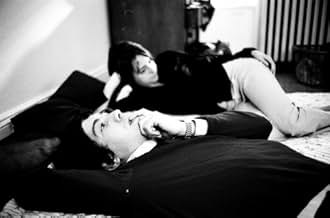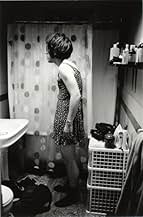VALUTAZIONE IMDb
6,7/10
2016
LA TUA VALUTAZIONE
Aggiungi una trama nella tua linguaAlan is a musician who leaves a busted-up band for New York, and a new musical voyage. He tries to stay focused and fends off all manner of distractions, including the attraction to his good... Leggi tuttoAlan is a musician who leaves a busted-up band for New York, and a new musical voyage. He tries to stay focused and fends off all manner of distractions, including the attraction to his good friend's girlfriend.Alan is a musician who leaves a busted-up band for New York, and a new musical voyage. He tries to stay focused and fends off all manner of distractions, including the attraction to his good friend's girlfriend.
- Regia
- Sceneggiatura
- Star
- Premi
- 2 vittorie e 3 candidature totali
Damian Hess
- Clay Loudermilk
- (non citato nei titoli originali)
Recensioni in evidenza
Without condemning the whole mumblecore movement, I think I sympathise more with its critics than its fans. The films certainly convey relationships between their characters realistically, and there are some scenes in each mumblecore film I've seen which I could almost recognise for myself, but I'm always overwhelmed by this slightly smug self-awareness that pervades many artists working under the 'indie' banner. It is easy to believe that the makers of these films are very similar to their characters young, confused, directionless but the fact that the focus most often falls on the progeny of the last bourgeois generation takes away the integrity of this gritty, frugal filming style.
Mutual Appreciation is as much a milestone of indie film-making as it is a victim of its own pretences. The observer paradox seems to pervade much of the dialogue, much of which feels calculatingly awkward it is easy to distinguish between the improvised lines and premeditated lines. Having said that, I was struck by one scene where Alan is besieged by with women at a 'party' he wasn't certain about going to in the first place, and is eventually convinced to don a dress and make-up. Here it seems the actors were given the most room to ad-lib, and it's a brilliant piece of footage which seems to speak to the majority of young adults and their issues with projecting identity.
Mutual Appreciation is as much a milestone of indie film-making as it is a victim of its own pretences. The observer paradox seems to pervade much of the dialogue, much of which feels calculatingly awkward it is easy to distinguish between the improvised lines and premeditated lines. Having said that, I was struck by one scene where Alan is besieged by with women at a 'party' he wasn't certain about going to in the first place, and is eventually convinced to don a dress and make-up. Here it seems the actors were given the most room to ad-lib, and it's a brilliant piece of footage which seems to speak to the majority of young adults and their issues with projecting identity.
I haven't seen this director's first film, the 2002 Funny Ha Ha, but I'm already a fan, if a mild one, from this second effort. It's enjoyable to watch the quiet textures of ordinary young adult American life that Andrew Bujalski weaves, because his people talk in ways that are both witty and remarkably believable, even if the rhythms are mostly lackadaisical.
"If John Cassavetes had directed a script by Eric Rohmer," Variety's Joe Leydon has written, "the result might have looked and sounded like Mutual Appreciation." That indeed does give you a starting point for understanding what Andrew Bujalski (a Harvard film graduate, now thirty-one) is up to, except that these aren't Seventies American actors or later French ones, but mostly twenty-something American non-actors, and the result of the blending of methods and interests of those two older directors is different, of course, from either Rohmer or Cassavetes. Bujalski's film is grainy black and white, the look is rough, the scenes are improvisational and vérité. The topics and the conversations are delicate, however, like Rohmer's; there aren't any long harangues or violent arguments or tortured late-night epiphanies as was Cassavetes' way. Attractions, desires, choices no huge dramas.
There's really just a triangle, two male friends and the girlfriend of one of them. The boyfriend is Lawrence (Bujalski himself); the girlfriend is Ellie (Rachel Clift). The other guy is Alan (Justin Rice, in real life founder of the indie-rock band Bishop Allen), who's just come to town (NYC, i.e., Brooklyn), whose band has split up, and who wants to get started again. Alan has an interview of radio, and the host, Sara (Seung-Min Lee) later hits on him. During the course of the action, at several times when Lawrence is away, Alan and Ellie acknowledge that they "like" each other. They have a "moment," as they say. But they don't do anything about it, as far as we see (the scenes are chopped off at the ends almost every time; that's the style). They both separately tell Lawrence about their "moment." Some consideration of gender roles comes up when Lawrence agrees -- very half-heartedly -- to participate in a reading of women's experiences with men; and when Alan is talked into putting on a dress. The trio of lovers and friends acknowledge the temptation to infidelity that has happened and end with a group hug. That's all that happens in the 109 minutes.
There's a hand-held camera, the grainy look of 16 mm., but Bujalski doesn't revel in the richness of black and white as Cassavetes' cameramen did. There's nothing particularly cinematic about Bujalski's method, which also has little to do with politics or current events or trends except for the presence of cell phones. There are hardly any exterior shots. But something magical does happen in the way Bujalski and Rice and the other main characters, who aren't particularly photogenic, to put it mildly, start to look good to us, because the inner beauty of their natures Alan's openness and positivity; Lawrence's sensitivity and goodness gradually emerges from the thick grain. Because Bujalski's kitchen-sink use of awkwardness is so adept, it almost disappears. The pace is sometimes excruciating, but in a way this isn't a movie; it doesn't feel like one; and that's not so bad.
What makes the movie a success is the naturalness doesn't seem forced or self-conscious. The people aren't actor-y like Cassavetes and his pals. Their conversations are choppy and awkward sometimes, but alert, even witty. These aren't Actors Studio-style tortured-intensity Stanislawski moments, but remarkably believable recreations of twenty-first-century, twenty-something American conversations. Bujalski's characters, as his Wikipedia bio says, are "well-educated, yet socially inept young white people." The scenes, which include a show at a club that's not very well attended, and a little gathering at an older man's house afterward followed by another dying party of three women in wigs who dress Alan in drag, and phone conversations between Alan, the singer, and his father (one of them to voice mail, while Alan strums his guitar and doesn't answer), have a documentary feel, but it's a documentary that's niftily edited, about people observed so nicely you end by liking them.
In limited release. Seen at Cinema Village NYC September 18, 2006.
"If John Cassavetes had directed a script by Eric Rohmer," Variety's Joe Leydon has written, "the result might have looked and sounded like Mutual Appreciation." That indeed does give you a starting point for understanding what Andrew Bujalski (a Harvard film graduate, now thirty-one) is up to, except that these aren't Seventies American actors or later French ones, but mostly twenty-something American non-actors, and the result of the blending of methods and interests of those two older directors is different, of course, from either Rohmer or Cassavetes. Bujalski's film is grainy black and white, the look is rough, the scenes are improvisational and vérité. The topics and the conversations are delicate, however, like Rohmer's; there aren't any long harangues or violent arguments or tortured late-night epiphanies as was Cassavetes' way. Attractions, desires, choices no huge dramas.
There's really just a triangle, two male friends and the girlfriend of one of them. The boyfriend is Lawrence (Bujalski himself); the girlfriend is Ellie (Rachel Clift). The other guy is Alan (Justin Rice, in real life founder of the indie-rock band Bishop Allen), who's just come to town (NYC, i.e., Brooklyn), whose band has split up, and who wants to get started again. Alan has an interview of radio, and the host, Sara (Seung-Min Lee) later hits on him. During the course of the action, at several times when Lawrence is away, Alan and Ellie acknowledge that they "like" each other. They have a "moment," as they say. But they don't do anything about it, as far as we see (the scenes are chopped off at the ends almost every time; that's the style). They both separately tell Lawrence about their "moment." Some consideration of gender roles comes up when Lawrence agrees -- very half-heartedly -- to participate in a reading of women's experiences with men; and when Alan is talked into putting on a dress. The trio of lovers and friends acknowledge the temptation to infidelity that has happened and end with a group hug. That's all that happens in the 109 minutes.
There's a hand-held camera, the grainy look of 16 mm., but Bujalski doesn't revel in the richness of black and white as Cassavetes' cameramen did. There's nothing particularly cinematic about Bujalski's method, which also has little to do with politics or current events or trends except for the presence of cell phones. There are hardly any exterior shots. But something magical does happen in the way Bujalski and Rice and the other main characters, who aren't particularly photogenic, to put it mildly, start to look good to us, because the inner beauty of their natures Alan's openness and positivity; Lawrence's sensitivity and goodness gradually emerges from the thick grain. Because Bujalski's kitchen-sink use of awkwardness is so adept, it almost disappears. The pace is sometimes excruciating, but in a way this isn't a movie; it doesn't feel like one; and that's not so bad.
What makes the movie a success is the naturalness doesn't seem forced or self-conscious. The people aren't actor-y like Cassavetes and his pals. Their conversations are choppy and awkward sometimes, but alert, even witty. These aren't Actors Studio-style tortured-intensity Stanislawski moments, but remarkably believable recreations of twenty-first-century, twenty-something American conversations. Bujalski's characters, as his Wikipedia bio says, are "well-educated, yet socially inept young white people." The scenes, which include a show at a club that's not very well attended, and a little gathering at an older man's house afterward followed by another dying party of three women in wigs who dress Alan in drag, and phone conversations between Alan, the singer, and his father (one of them to voice mail, while Alan strums his guitar and doesn't answer), have a documentary feel, but it's a documentary that's niftily edited, about people observed so nicely you end by liking them.
In limited release. Seen at Cinema Village NYC September 18, 2006.
I saw Mutual Appreciation on the bottom row of a 'new release' section of a movie shop and it caught my eye. I usually am a sucker for movies that are deeper than the average celluloid we are bombarded with. I didn't have a great expectation for the movie, which turned out to be great. The dialog isn't deep. And it isn't meant to be. It's very real to life. The colours and positioning really captured the essence of the movie: bleak and monotonous. I did like it for the fact I felt that I could relate to more than one character, and the characters were realistic and likable. I've read previous remarks, and I suppose the only advice I can give is to watch the movie without expectations and with a open mind. On reflection, try and see if you can relate some of the central themes to your life and you will be pleasantly surprised. As a 16 year old that is trying to find movies that break the conventional mould, I found this refreshing and it made me hopeful for some reason. I will definitely be checking out Funny Ha Ha.
I bet Andrew Bujalski is sick of reading that he's the voice of his generation, when most of that neo-slacker demographic has never had the opportunity to see his films. Like Funny Ha Ha, Mutual Appreciation is hardly your standard Amerindie
It's shot on 16mm black-and-white, thus confirming Bujalski's allegiance to a strain of maverick filmsShadows, Stranger than Paradise, Clerksthat bring poignantly accurate renditions of subcultures of which their directors have intimate knowledge to otherwise homogenized screens. While Cassavetes is the most obvious influence, one might also regard Funny Ha Ha and Mutual Appreciationas Rohmer without subtitles. Both films are "moral tales" whose characters leap to language as offense and defense.Amy Taubin
I respect this movie very much. It does an excellent job of creating realistic situations and natural dialogue. But it almost feels too real at times. Watching this movie is as if I was sitting in a room watching my friends talk and mentally filming it. I respect the attempt but there's a reason why movies are scripted! Real life conversations can get boring at times. And in this movie, the director let many scenes run far longer than they needed to. And the lack of any semblance of a real story emphasizes its quality as a snippet of a week or so in the lives of three 20s New Yorkers.
Mutual Appreciation is one of the first I've seen where I feel totally like I am watching real life. And this creates some very funny moments. But it also leads to many dull points and a lack of direction to the film, which is easily recognized as the intention of the director. But I don't think it makes a great film. A film to be respected for its attempt, but not necessarily enjoyable or a great film.
Mutual Appreciation is one of the first I've seen where I feel totally like I am watching real life. And this creates some very funny moments. But it also leads to many dull points and a lack of direction to the film, which is easily recognized as the intention of the director. But I don't think it makes a great film. A film to be respected for its attempt, but not necessarily enjoyable or a great film.
Lo sapevi?
- ConnessioniSpin-off Peoples House (2007)
I più visti
Accedi per valutare e creare un elenco di titoli salvati per ottenere consigli personalizzati
Dettagli
Botteghino
- Lordo Stati Uniti e Canada
- 103.509 USD
- Fine settimana di apertura Stati Uniti e Canada
- 13.141 USD
- 3 set 2006
- Lordo in tutto il mondo
- 121.292 USD
- Tempo di esecuzione1 ora 49 minuti
- Colore
- Proporzioni
- 1.66 : 1
Contribuisci a questa pagina
Suggerisci una modifica o aggiungi i contenuti mancanti























